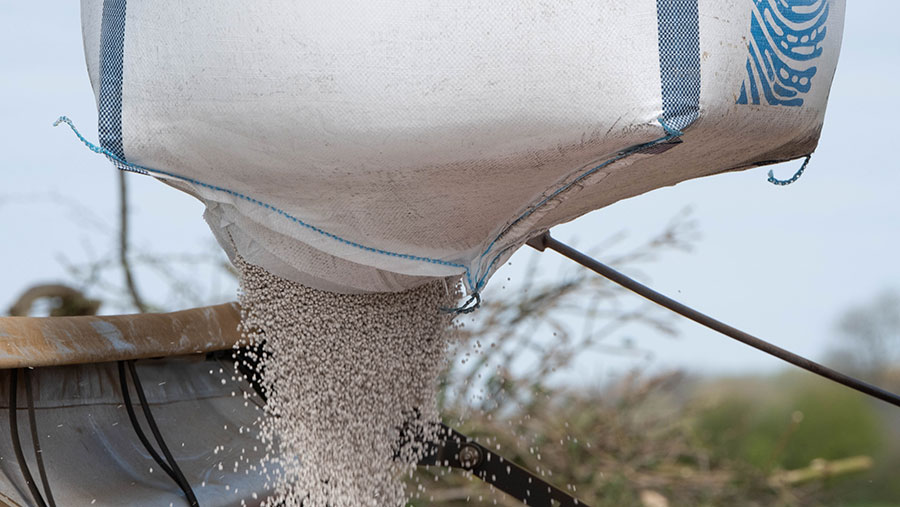NFU warning over lack of transparency in fertiliser markets
 © Tim Scrivener
© Tim Scrivener The government and industry must build transparency into the fertiliser market to improve farmer confidence in decision-making and build resilience in the nation’s food security, the NFU has warned.
Speaking ahead of the Cereals event, NFU deputy president Tom Bradshaw said a complete lack of transparency in the fertiliser market was leaving growers without enough information to inspire confidence in their input purchasing decisions.
According to the AHDB, nitrogen fertiliser prices have increased by 180% year-on-year. In April 2021, the price was £281/t. In April 2022, the price was £785/t.
See also: Tips on how arable farms can manage risk next season
Fertiliser prices have risen to new highs and global supplies have been hit by geopolitical events, in particular Russia’s war with Ukraine, which has driven up the price of natural gas, a key ingredient in fertiliser, and led to severe EU sanctions against Russia, a major exporter of fertiliser.
Mr Bradshaw told Farmers Weekly: “Over the past month, we have seen fertiliser prices launched at about £620-£625/t withdrawn at the end of the day and come back out £50-£60 higher, but for an October-December delivery period.
“Then I received an email quoting £750/t back at June again. How can that happen? The price gap hasn’t changed much in that period of time.
“The price is there for a moment and then it’s withdrawn. It doesn’t give farmers any time to make decisions and it feels as if they are being held to ransom.”
To achieve greater transparency, the NFU is calling on suppliers to publish fertiliser prices immediately to help farm businesses plan for next year’s crop.
‘Reopen plant’
It is also asking government and industry to come forward with a range of options that would enable CF Fertiliser’s second plant in Ince, Cheshire, to reopen and start producing fertiliser again.
Mr Bradshaw said it was “very strange” that more fertiliser was not being produced in the UK when gas prices appear to be at a seasonal low.
“CF Fertiliser’s Billingham plant is open and Ince is shut. I would be very interested in the answer to what it would take to get Ince [factory] reopened,” he added.
“When I look at the situation globally, I think nitrogen fertiliser is probably going to be the limiting factor for the next 18 months, which, alongside the crisis in Ukraine, will restrict global crop production and deepen the humanitarian disaster.
“I find it frustrating that we have a fertiliser factory here that isn’t producing fertiliser at a time when nitrogen is likely to be the limiting factor.”
Tough decisions
NFU crops board chairman Matt Culley said months of high prices – with nitrogen fertiliser costing three times as much as it did this time last year – was having a huge effect on arable growers.
Consequently, growers were having to make tough decisions now on what to plant this autumn, whether to downsize production, or reduce the amount of fertiliser used, which could affect productivity.
Farmers Weekly has requested responses from both CF Fertilisers and the UK government.
A press briefing will be held at 9am on Wednesday 8 June at the NFU stand (226) at the Cereals event, featuring NFU deputy president Tom Bradshaw and crops board chairman Matt Culley.
AIC responds to NFU request for more transparency on fertiliser markets
The Agricultural Industries Confederation (AIC), which represents the UK agri-supply sector, said it recognised the difficulties farmers were facing because of global events and market uncertainties, particularly around fertiliser price and supply.
In a statement, the AIC said that since September it had been advising farmers to engage early with their suppliers to ensure they were aware of product availability, including fertiliser.
It had also identified the risk of demand destruction in the market if farmers and growers did not place orders in a timely fashion.
A spokesperson said: “Throughout this spring, the AIC consistently advised government that it will have to consider replicating measures taken in the EU to stimulate on-farm demand for fertiliser, to ensure UK agriculture remains competitive and sustainable.
“Since March 2022, the AIC has been holding fortnightly meetings with all UK farming unions to discuss the ongoing global agri-supply situation regarding inputs, including fertiliser. The question of greater transparency has not been raised in these meetings.
“For many years, the industry has been working together to encourage farmers to take advice on crop nutrition from a Facts-qualified adviser, to ensure fertiliser requirements are matched to each on-farm situation.
“Through this spring we have repeated this message that these steps should be taken in advance of the 2023 season. The AIC also recommends that farmers speak to their fertiliser suppliers early, to get information on pricing and availability.”
The AIC said it would welcome further discussion with farming stakeholders to understand their concerns relating to the fertiliser market.
